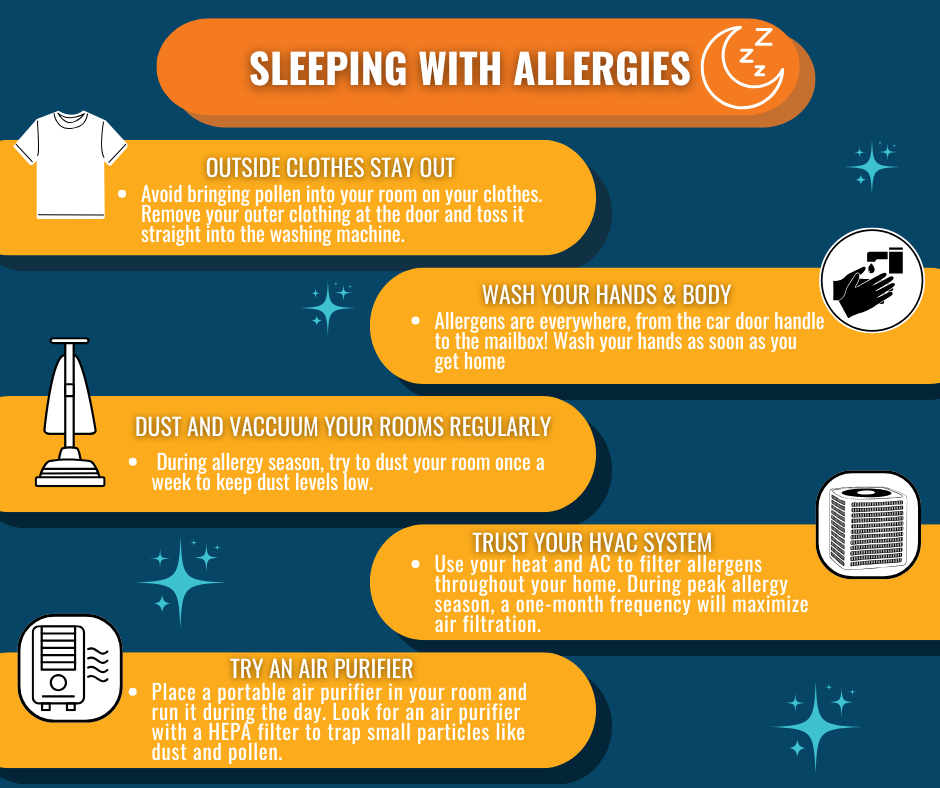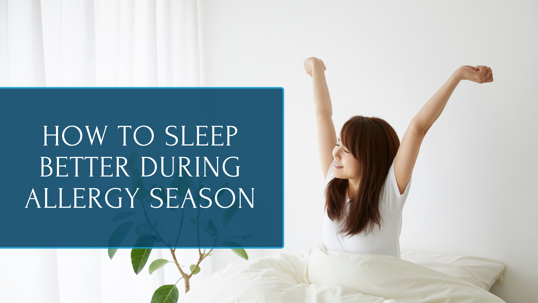Are coughing, sneezing, or itchy eyes preventing you from sleeping well during allergy season?
According to one study, roughly a quarter of US adults have seasonal allergies, including tree and grass pollen, ragweed, and mold spores. Combined with those who suffer from indoor allergies, like dust, dander, and mold, it’s likely that someone in your household could be sleeping better.
Learn how regular cleaning, strategic HVAC use, and simple habits can help you or your loved one get a better night’s sleep during central Kentucky’s lengthy allergy season.
What Causes of Bedroom Allergies?
Most adults are allergic or sensitive to multiple allergens, including a mix of indoor and outdoor irritants. Indoor allergens, like dust, pet dander, and mold, can negatively impact sleep just as much as seasonal allergens. If you’re experiencing poor sleep quality year-round, you might be fighting both indoor and outdoor allergens.
Read more: Tips to Improve Indoor Air Quality

![]()
Allergies and Sleep: Why It’s So Hard to Get Shut-Eye
Seasonal allergy sufferers dread spring blooms, summer hay fever, and fall mold, in part because it’s difficult to sleep with a drippy nose, sinus pressure, or a nagging cough.
You might notice your symptoms are worse when you sleep. Allergies tend to be more severe at night due to the increased exposure to the bedroom allergens we listed above, plus your body’selevated histamine levels at night. For some individuals, simply lying down can exacerbate symptoms due to airway anatomy.
How to Sleep Better with Allergies
If you’re experiencing sleep-limiting allergies in the bedroom, follow these five tips!
- Outside clothes stay out – Avoid bringing pollen into your room on your clothes. Remove your outer clothing at the door and toss it straight into the washing machine.
- Wash your hands and body – Allergens are everywhere, from the car door handle to the mailbox! Wash your hands as soon as you get home, and avoid touching your mouth, nose, and eyes until your hands are clean. Take a shower if you’ve spent a lot of time outside to remove allergens from your hair and skin.
- Dust your room regularly – Bedrooms typically gather a lot of dust. We spend a lot of time in them, but there’s generally little airflow or ventilation, which means dust accumulates quickly. During allergy season, try to dust your room once a week to keep dust levels low.
- Use your HVAC system – Replace your HVAC’s air filter every one to three months. During peak allergy season, a one-month frequency will maximize air filtration. Check your owner’s manual or contact Allen’s Air Conditioning to see if a HEPA filter is compatible with your system. Finally, use your heat and AC often enough that the systems don’t accumulate debris from sitting idle.
- Try an air purifier – Use an air purifier to remove allergens before concentrations become a problem. Look for an air purifier with aHEPA filter to trap small particles like dust and pollen.
Does Sleeping with a Humidifier Help Allergies?
Sleeping with a humidifier may alleviate symptoms for some individuals, but it’s far from a universal solution. High humidity levels may worsen allergies, especially for people sensitive to mold and dust.
What Is the Best Temperature and Humidity for Sleeping?
The ideal temperature and humidity for sleeping are 60-67 degrees Fahrenheit, and indoor humidity is 30% to 50%. The EPA recommends keeping your home within these ranges, cleaning regularly, and maintaining your HVAC system to promote indoor air quality.
Breathe Easier with Elizabethtown’s Indoor Air Quality Experts
Allen's Air Conditioning—Heating & Duct Cleaning can help you stay comfortable all year! Our expert technicians offer reliable service and trustworthy recommendations. We're proud to serve Fort Knox, Columbia, and greater Elizabethtown; see why your neighbors recommend us!
Contact us onlineor call 270-946-1525 to schedule an appointment!

